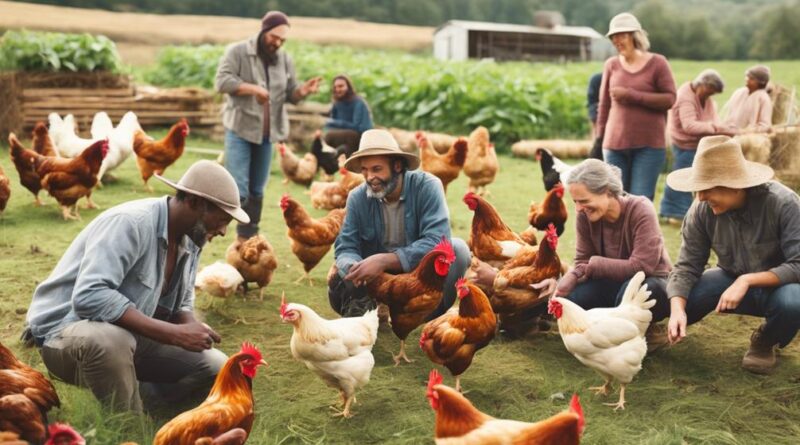3 Best Approaches to Ethical Chicken Farming Controversies
In addressing ethical chicken farming controversies, prioritize animal well-being, sustainable practices, and transparency. Ensure chickens have access to outdoors, natural light, and space. Avoid antibiotics and growth hormones. Implement regenerative agriculture to enhance land health and biodiversity. Embrace transparency to build trust with consumers. Educate them on farming methods and offer farm tours. By focusing on these three pillars, you can navigate the complexities of ethical chicken farming controversies effectively.
Ethical Treatment of Chickens
When considering ethical treatment of chickens in farming practices, it's crucial to prioritize their well-being throughout all stages of their life cycle. Animal welfare is a key aspect that should drive the practices in chicken farming. Organic farming, which focuses on natural methods and the well-being of the animals, is gaining popularity as a more ethical approach to raising chickens.
Organic farming methods emphasize providing chickens with access to the outdoors, natural light, and space to engage in their natural behaviors such as scratching and dust bathing. These practices contribute to the overall welfare of the chickens. Additionally, organic farming prohibits the use of antibiotics and growth hormones, promoting a healthier environment for the chickens and reducing potential harm to consumers.
Sustainable Farming Practices
Sustainable farming practices play a crucial role in ensuring the long-term viability and ethical integrity of chicken farming operations. By implementing regenerative agriculture techniques, farmers can't only improve the health of the land but also enhance animal welfare. Regenerative agriculture focuses on restoring soil health, increasing biodiversity, and reducing the reliance on external inputs, leading to more sustainable farming practices.
When farmers prioritize regenerative agriculture, they create a more natural environment for chickens to thrive. This approach often involves rotating pastures, allowing the land to rest, and integrating livestock into the farming system. These practices mimic natural ecosystems, promoting healthier soils, plants, and animals. As a result, chickens raised in such environments tend to exhibit natural behaviors, have access to a varied diet, and experience lower stress levels.
Furthermore, sustainable farming practices that prioritize animal welfare contribute to the overall ethical integrity of chicken farming. By providing chickens with ample space to move around, access to the outdoors, and comfortable living conditions, farmers can ensure that the chickens lead fulfilling lives. Consumers are increasingly concerned about the treatment of animals in the food industry, making ethical considerations a crucial component of sustainable farming practices. Therefore, integrating regenerative agriculture techniques with a focus on animal welfare is essential for the long-term success of chicken farming operations.
Transparency in Chicken Farming
Transparency in chicken farming practices is essential for fostering trust between producers and consumers. By promoting transparency, chicken farmers can provide consumers with a better understanding of how chickens are raised, the conditions they're kept in, and the practices employed throughout the farming process. This openness can help consumers make informed decisions about the products they purchase and consume.
One way to enhance transparency in chicken farming is through increased consumer education. By educating consumers about the various farming practices, such as free-range, cage-free, or organic, they can make choices that align with their values and beliefs. This knowledge empowers consumers to support practices that prioritize animal welfare and sustainability.
Furthermore, transparency promotion can also involve initiatives such as farm tours, open houses, or online webcams that allow consumers to see firsthand how chickens are raised. These direct experiences can build trust and credibility for chicken producers, showcasing their commitment to ethical and responsible farming practices.
Frequently Asked Questions
Are There Any Initiatives for Chicken Welfare Research and Development?
Yes, there are several initiatives focusing on chicken welfare research and development. Innovations in welfare and technology advancements have led to increased understanding and improved practices in this area.
Researchers are exploring ways to enhance living conditions, reduce stress, and ensure better overall well-being for chickens. These efforts are crucial for promoting ethical practices and sustainability in the poultry industry.
How Do Chicken Farms Address the Issue of Antibiotic Use?
When it comes to addressing antibiotic use, chicken farms have started exploring antibiotic alternatives to promote healthier farming practices.
Additionally, many farms are prioritizing farm-to-table transparency to keep consumers informed about the production process.
What Measures Are Taken to Reduce Carbon Footprint in Chicken Farming?
To reduce the carbon footprint in chicken farming, sustainable practices like optimizing feed efficiency and waste management are crucial. These measures aim to lessen the environmental impact of poultry production.
By striving to become carbon neutral and implementing emission reduction strategies, chicken farms can contribute positively to the environment.
It's essential for the industry to continue exploring innovative ways to operate more sustainably and minimize their carbon footprint.
Are There Any Certifications for Ethical Chicken Farming Practices?
When it comes to ethical chicken farming, there are indeed certifications available to ensure adherence to certain standards. These certification programs establish guidelines that cover aspects like animal welfare, environmental sustainability, and worker conditions. By meeting these certification standards, farmers demonstrate their commitment to ethical practices.
Industry regulations also play a crucial role in overseeing compliance and holding farms accountable for their practices. These measures collectively contribute to promoting ethical standards in chicken farming.
How Do Chicken Farms Ensure Humane Treatment During Transportation?
When ensuring humane treatment during transportation, chicken farms prioritize animal welfare by maintaining suitable transportation conditions. Proper ventilation, temperature control, and limited travel durations are crucial factors in safeguarding the well-being of the chickens.
Conclusion
In conclusion, ethical chicken farming practices involve treating chickens humanely, implementing sustainable farming methods, and promoting transparency in the industry. By adopting these approaches, farmers can address controversies surrounding chicken farming and work towards a more ethical and sustainable future.
It's essential for consumers to support and demand these practices to ensure the well-being of chickens and the environment. Ultimately, a collaborative effort is needed to create a more ethical and responsible chicken farming industry.
